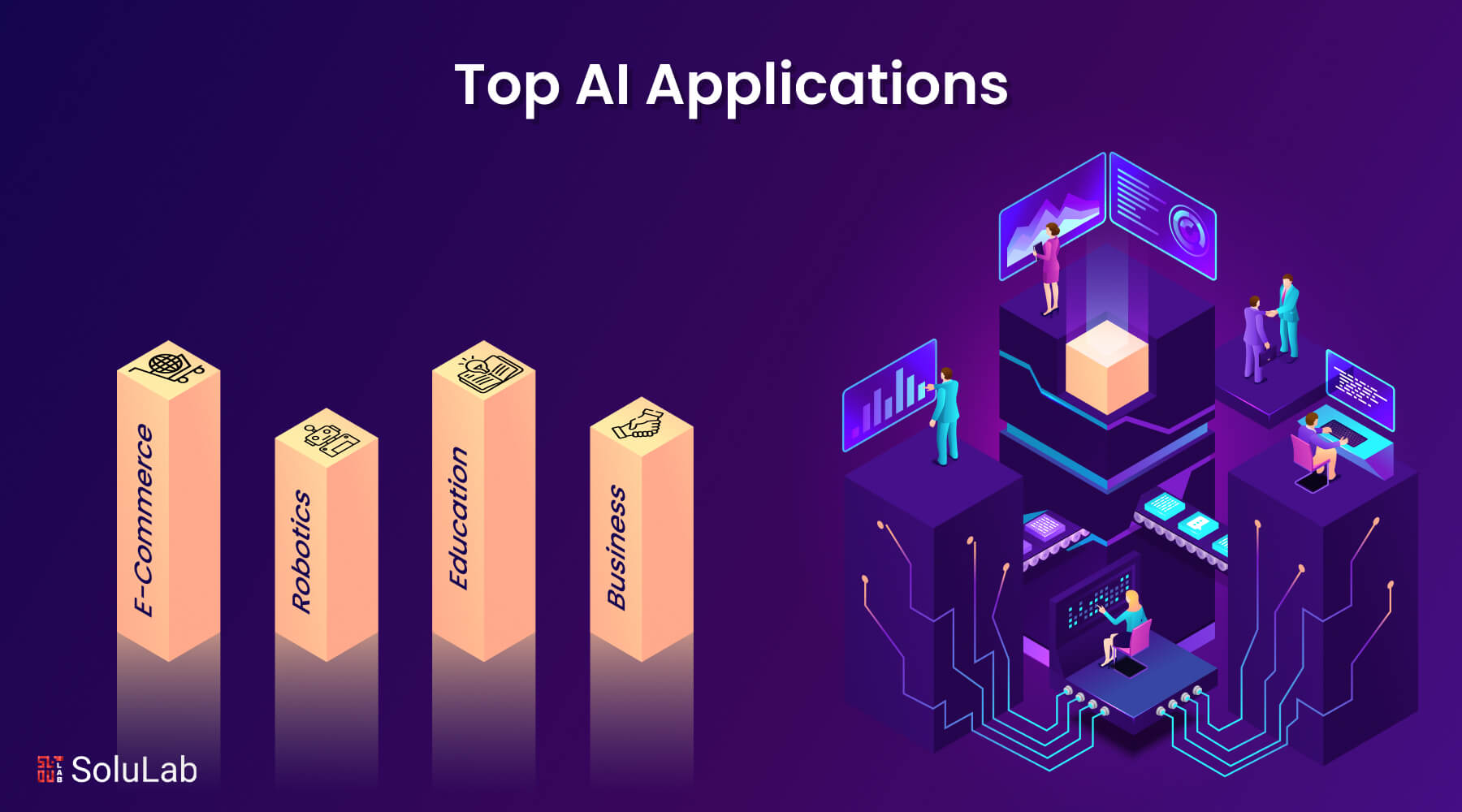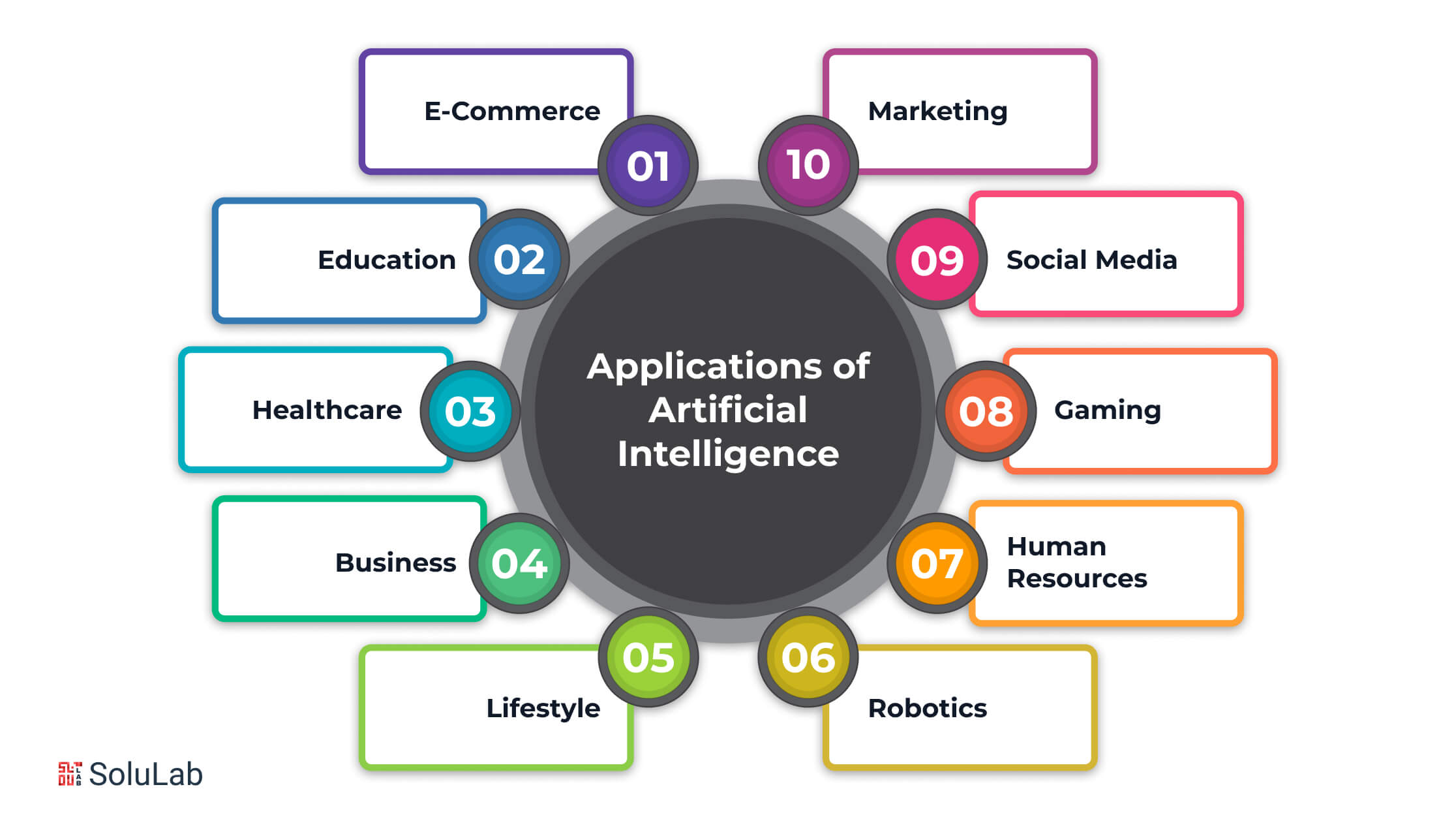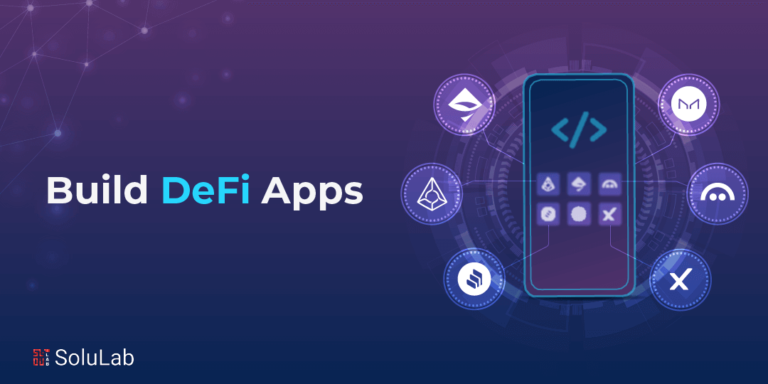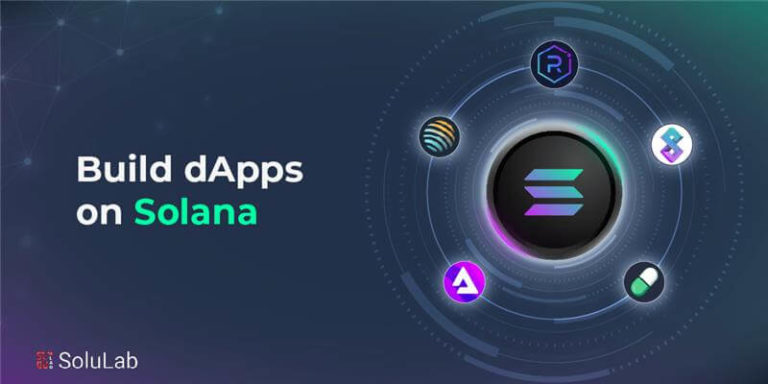
Artificial intelligence (AI) is influencing patterns in a variety of industries throughout the world. AI applications are revolutionizing our lives thanks to technological breakthroughs. The function and growing acceptance of artificial intelligence are increasing by the day. Artificial intelligence refers to a system’s or program’s power to think and learn via experience. AI applications have progressed substantially over the last few years, with applications in practically every industry area. The world is becoming more digital as AI trends are integrated with various applications and gadgets. In this blog, we will look at the top 10 applications of artificial intelligence in 2025 in robotics, healthcare, military, and a variety of other fields.
So, without any further ado, let’s get started!
What is Artificial Intelligence?
Artificial intelligence (AI) refers to the development of computer systems that can perform tasks that typically require human intelligence. These tasks encompass a broad range of activities, including problem-solving, learning, speech recognition, and decision-making. At its core, AI aims to create algorithms and models capable of mimicking cognitive functions, enabling machines to process information, adapt to changing scenarios, and execute actions without explicit programming for each step.
AI can be categorized into two main types: narrow or weak AI, and general or strong AI. Narrow AI is designed to perform specific tasks, such as image recognition or language translation, while general AI seeks to emulate human-like cognitive abilities across diverse domains. While the field has made significant strides in recent years, challenges persist in achieving truly autonomous, self-aware machines. The ongoing exploration and refinement of AI technologies hold promise for transforming various industries and enhancing our ability to solve complex problems across different domains.
Facts and Figures About Artificial Intelligence
- According to Statista, revenues from the global Artificial Intelligence (AI) software industry are predicted to reach 126 billion dollars by 2025.
- As per Gartner, 37% of firms have used AI in some form. Over the last four years, the percentage of businesses that use artificial intelligence has increased by 270%.
- According to Servion Global Solutions, by 2025, AI will fuel 95% of all client interactions.
- As per Statista’s 2020 estimate, the worldwide AI software industry is anticipated to increase by 54% annually, reaching USD $22.6 billion.
Let’s look at how AI is applied in many fields.
What Are the Applications of Artificial Intelligence?

Here is an overview of the top 10 AI applications in 2025:
E-Commerce
-
Personalized Shopping
Artificial intelligence technology is utilized to construct recommendation systems, allowing you to better connect with your consumers. These latest artificial intelligence applications are produced based on their browsing history, preferences, and interests. It improves your relationship with your clients and their commitment to your brand.
-
AI-Powered Assistants
Virtual shopping assistants and chatbots increase the customer experience when buying online. Natural Language Processing is utilized to make the communication sound as authentic and intimate as feasible. Furthermore, these assistants are capable of engaging with your consumers in real time. Did you know that on Amazon.com, customer care will soon be done by chatbots?
-
Fraud Prevention
Credit card theft and bogus reviews represent two of the most serious concerns that E-Commerce enterprises face. By taking into account use patterns, AI can help limit the potential of credit card theft. Customers often choose to purchase a product or service based on consumer reviews. Artificial intelligence can assist in identifying and managing bogus reviews.
Education
Although humans have had the most effect on the education industry, Artificial Intelligence has steadily begun to make inroads. Even in the education industry, the sluggish shift to Artificial Intelligence has increased faculty efficiency and allowed them to focus on students rather than office or administrative tasks.
Some of the applications in this field are:
-
Automated Administrative Tasks
Artificial intelligence can assist teachers with non-educational tasks such as enabling and automating customized messages to students, back-office tasks such as grading paperwork, scheduling and facilitating parent and guardian conversations routine issue feedback facilitation, enrollment, course management, and HR-related issues.
-
Generating Smart Content
The latest artificial intelligence applications can help digitize information such as video lectures, conferences, and textbook aids. We may customize alternative interfaces, such as animations and learning content, for pupils of various grades. Artificial intelligence contributes to a rich learning experience by creating and delivering audio and video summaries, as well as comprehensive lesson plans.
-
Voice Assistants
It provides students with access to additional learning materials and support without the need for direct interaction from lecturers or teachers. This reduces the expense of producing temporary handbooks while also making it simple to address frequently asked concerns.
-
Personalized Learning
Using advanced AI technology, hyper-personalization techniques may be utilized to comprehensively monitor students’ data, allowing for the creation of habits, lesson plans, reminders, study aids, flash notes, frequency of review, and more.
Healthcare
Top AI applications in healthcare are increasingly permeating the industry, catalyzing a transformation in operational dynamics. The future of AI in healthcare has ushered in inefficiencies, liberating healthcare professionals to concentrate more on patient-centric activities by automating routine and administrative tasks.
Key applications in this domain include:
-
Automated Administrative Processes
AI streamlines administrative workflows by automating tasks such as appointment scheduling, record-keeping, and billing procedures. Facilitates efficient patient communication, feedback management, and enrollment processes, enabling healthcare providers to allocate more time to direct patient care.
-
Diagnostic Support
AI assists healthcare practitioners in diagnostic tasks, offering insights derived from the analysis of medical images, lab results, and patient records. Enhances diagnostic accuracy by providing quick and data-driven information, contributing to more informed decision-making.
-
Smart Clinical Documentation
AI aids in the digitization of clinical information, transforming handwritten notes and reports into structured, electronic formats. Improves the speed and accuracy of documentation processes, ensuring comprehensive and organized patient records for better continuity of care.
Business
In the business sector, the latest artificial intelligence applications progressively assert its influence, introducing transformative efficiencies and reshaping operational paradigms. The integration of top artificial intelligence applications in business domains has ushered in a new era of automation, data-driven decision-making, and enhanced productivity. Here are some top AI applications in business:
-
Automated Customer Interaction
AI-powered chatbots and virtual assistants streamline customer interactions by providing instant responses to queries and facilitating routine tasks. Enhances customer service by automating order processing, handling FAQs, and personalizing user experiences.
-
Data Analytics and Business Intelligence
AI algorithms analyze vast datasets, extracting meaningful insights to inform strategic decision-making. Facilitates predictive analytics, trend identification, and market forecasting, empowering businesses to stay competitive in dynamic markets.
-
Supply Chain Optimization
Artificial Intelligence app optimize supply chain operations by predicting demand, improving inventory management, and enhancing logistics. Enables real-time tracking, reduces inefficiencies, and ensures a more agile and responsive supply chain.
Lifestyle
Artificial Intelligence (AI) has significantly impacted various facets of our lifestyle, and numerous applications underscore its pervasive influence as some of the top applications of AI.
Read Also: How to Integrate AI Into Your App?
-
Autonomous Vehicles
AI plays a pivotal role in the automotive industry, where major manufacturers such as Toyota, Audi, Volvo, and Tesla employ machine learning to imbue computers with human-like thinking for driving in diverse environments. Object detection algorithms enhance safety by preventing accidents through intelligent decision-making.
-
Spam Filters
In our routine use of emails, AI-driven spam filters have become indispensable. Services like Gmail leverage AI to achieve an impressive filtration capacity of around 99.9%, automatically directing spam emails to designated folders. This ensures that users only encounter legitimate and relevant content.
-
Facial Recognition
Everyday devices like smartphones, laptops, and PCs utilize facial recognition powered by AI algorithms. Employing face filters, these systems provide secure access by detecting and identifying users. Beyond personal devices, facial recognition finds widespread application in high-security sectors across various industries.
Robotics
Artificial Intelligence (AI) has revolutionized the field of robotics, introducing modern applications that have transformed the way robots operate and interact with the world. Here are some of the top AI applications in robotics:
-
Autonomous Navigation
AI equips robots with the ability to navigate and move autonomously in complex environments. This is particularly crucial in industries such as manufacturing and logistics, where robots can efficiently carry out tasks without constant human intervention.
-
Object Recognition and Manipulation
Advanced AI algorithms enable robots to recognize and manipulate objects with precision. This is vital in sectors like warehouse automation, where robots can identify, pick, and pack items, enhancing efficiency and speed in logistics operations.
-
Collaborative Robots (Cobots)
AI facilitates the development of collaborative robots, or cobots, that can work alongside humans safely. These robots use AI to adapt to dynamic environments, making them well-suited for tasks that require close collaboration with human workers.
Human Resources
Artificial Intelligence (AI) has become a cornerstone in revolutionizing Human Resource (HR) chatbots, introducing innovative applications that streamline processes and elevate workforce management. Here are some of the top Artificial Intelligence app in HR:
-
Automated Recruitment Processes
AI is employed in automating various stages of the recruitment process, from resume screening to candidate shortlisting. This ensures efficient and unbiased candidate selection, saving time for HR professionals.
-
Employee Onboarding and Training
AI facilitates personalized onboarding experiences by tailoring training programs based on individual employee needs. The power of Chatbots powered by AI can provide instant responses to queries, enhancing the onboarding process and promoting a positive employee experience.
-
Predictive Analytics for Talent Management
AI-driven predictive analytics analyzes vast datasets to identify trends and patterns related to employee performance, turnover, and engagement. This helps HR professionals make data-driven decisions, optimize talent management strategies, and predict future workforce needs.
Gaming
Artificial Intelligence (AI) has significantly reshaped the gaming industry, introducing advanced applications that redefine player experiences and push the boundaries of what is achievable within the gaming realm. Here are some key AI applications in gaming:
-
NPC Behavior Enhancement
AI algorithms play a crucial role in crafting lifelike behaviors for Non-Player Characters (NPCs) in video games. These intelligent NPCs adapt and respond to player actions, contributing to a more immersive and challenging gaming experience.
-
Procedural Content Generation
AI is utilized for generating game content dynamically, including landscapes, levels, and characters. This approach provides a diverse array of gaming environments without the need for manual design.
-
Adaptive Difficulty Systems
AI contributes to creating adaptive difficulty systems that dynamically adjust the challenge level of the game based on the player’s skill. This ensures a balanced and engaging experience for gamers of varying proficiency levels.
Social Media
Artificial Intelligence (AI) has become a cornerstone in reshaping the dynamics of social media, with one of the top 10 AI applications influencing how users interact and engage on these platforms. Here are key AI applications in the realm of social media:
-
Instagram
On Instagram, AI uses your likes and the accounts you follow to choose which posts appear on your explore tab.
-
Facebook
Facebook utilizes AI and DeepText. This feature allows Facebook to better interpret discussions. It can automatically translate posts from several languages.
-
Twitter
Twitter uses AI to identify fraud and remove offensive material. Twitter also utilizes AI to suggest tweets that users might like depending on the sort of tweets they engage with.
Marketing
Artificial Intelligence (AI) has emerged as a game-changer in the field of marketing, playing a pivotal role in reshaping strategies and optimizing various processes. Here are key AI applications in marketing:
-
Personalized Customer Experiences
AI tailors marketing efforts by analyzing individual customer data, allowing businesses to create personalized experiences. This includes customized product recommendations, targeted messaging, and personalized content delivery to enhance customer engagement.
-
Dynamic Pricing Optimization
AI algorithms analyze market conditions, competitor pricing, and customer behavior to optimize pricing strategies dynamically. This ensures businesses remain competitive and can adjust prices based on real-time data.
-
Ad Campaign Optimization
AI optimizes advertising campaigns by analyzing performance metrics in real time. This includes adjusting bidding strategies, targeting parameters, and ad creatives to maximize return on investment (ROI) and campaign effectiveness.
Why is Artificial Intelligence Used?
The utilization of Artificial Intelligence (AI) is driven by the escalating demands of daily tasks, prompting individuals to turn to automation as a practical solution. These latest artificial intelligence applications’ strategic approach not only relieves the workforce from routine responsibilities but also amplifies overall productivity. Moreover, organizations harness the power of AI to attract and engage skilled professionals, fostering the company’s growth and development.
In contemporary business practices, there is a prevailing sentiment among enterprises that seeks to automate mundane and repetitive tasks. The prevailing belief is that the automation of such routine functions can be achieved through straightforward applications. As advancements in data science continue, automation becomes increasingly prevalent. One prominent application of AI in this context is observed in online chat portals, where automated welcome messages greet visitors on websites, initiating genuine conversations. This reflects a broader trend where businesses aspire to leverage Conversational AI to streamline routine tasks and capitalize on the evolving landscape of data science.
Conclusion
In summary, the applications of Artificial Intelligence (AI) in 2025 reveal a dynamic and impactful progression across various industries. From the implementation of AI in autonomous vehicles and healthcare innovations to its role in personalized marketing and gaming experiences, the transformative influence of AI is palpable. As these applications continue to refine and reshape operations, the future promises a landscape rich with possibilities, driving efficiency and innovation alike.
For those seeking to leverage the power of AI in their projects or businesses, SoluLab emerges as a stalwart in the world of AI development. Functioning as a leading AI development company, SoluLab offers a comprehensive suite of AI development services. Whether your goal is to seamlessly integrate AI into existing systems, create a customized AI solution, or hire AI developers, SoluLab provides tailored solutions to suit your unique requirements. Propel your projects with modern AI technologies – explore the potential with SoluLab today! Contact us now!
FAQs
1. How will AI impact the healthcare industry in 2025?
AI is significantly influencing healthcare by enhancing diagnostics through medical imaging analysis, aiding in personalized medicine, and facilitating predictive analytics for patient care. These applications contribute to improved outcomes, cost-effectiveness, and overall efficiency in healthcare delivery.
2. What role does AI play in the gaming industry today?
In the gaming industry, AI is pivotal for creating realistic NPC behaviors, procedural content generation for diverse gaming environments, and adaptive difficulty systems. Additionally, AI contributes to dynamic pricing optimization, personalized gaming experiences, and enhancing anti-cheat measures for online multiplayer games.
3. How does AI revolutionize social media interactions?
AI applications in social media include content recommendation systems for personalized feeds, image and video recognition for content moderation, sentiment analysis for understanding user opinions, and chatbots for instant customer interactions. These applications enhance user experiences and contribute to more targeted marketing.
4. What are the top AI applications in marketing strategies?
Some of the top AI applications in marketing include predictive analytics for data-driven decision-making, personalized customer experiences through tailored recommendations, chatbots for automated customer interactions, dynamic pricing optimization, and content creation and curation.
5. How does AI automate routine tasks in everyday life?
AI automates routine tasks in everyday life by leveraging algorithms for efficiency. This includes automated administrative tasks in education, spam filters in emails, and voice assistants for additional learning materials and support without direct human interaction.
6. How can SoluLab assist in AI application development services?
SoluLab, as a leading AI application development company, offers a range of services including integration of AI into existing systems, development of custom AI solutions, and hiring of dedicated AI developers. Their tailored solutions cater to specific project needs, ensuring clients harness the full potential of advanced AI technologies.






